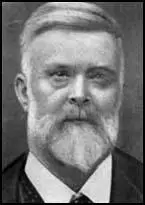Benjamin Pickard

Benjamin Pickard, the son of Thomas Pickard, a miner, was born in Kippax near Leeds on 28th February 1842. He was educated at Kippax Grammar School until he was twelve years old when he left to become a miner. Pickard was brought up as a Wesleyan he was a teetotaler and supporter of the Temperance Society.
In 1864 Pickard married Hannah Elizabeth Freeman. They had four sons and four daughters. His biographer, John Benson, has pointed out: "Pickard was active in the trade union movement at an early age, first at regional, then at national and international levels. He joined the Kippax lodge of the West Yorkshire Miners' Association, becoming lodge secretary at the age of sixteen. He went on to become assistant secretary of the association in 1873, and three years later he was appointed general secretary. He took a leading role in the 1881 amalgamation of the West Yorkshire Miners' Association and the South Yorkshire Miners' Association into the Yorkshire Miners' Association. As first general secretary of the new organization, he saw it grow into the third largest trade union in the coal industry, and one of the largest in the country."
In the summer of 1888 the price of coal began to rise. All over Britain miners began to talk about the need for a pay increase. When colliery owners rejected the claims of the Yorkshire Miners' Association, Pickard, sent out a circular inviting all miners "to attend a conference for the purpose of considering the best means of securing a 10% advance in wages and of trying to find common ground for action." The Conference took place in Derby on 29th October, 1888 where the formation of a new national union was discussed but no agreement was reached.
Ben Pickard called another conference in Newport on 26th November 1889. Pickard selected Newport as it was fiftieth anniversary of the Chartist Newport Uprising. Those attending included James Keir Hardie, Thomas Burt, Herbert Smith, Sam Woods, Thomas Ashton and Enoch Edwards. At the conference it was decided to form the Miners' Federation of Great Britain and Pickard was elected as its first president.
Pickard was a member of the Liberal Party, Pickard was elected to the House of Commons in the 1885 General Election, to represent Normanton, a constituency in which over 60 per cent of the electorate were miners. In Parliament he advocated the payment of MPs and the abolition of the House of Lords. Pickard also supported Charles Bradlaugh and campaign for an Affirmation Bill. However, his main campaign was for a statutory eight-hour day for underground workers.
Pickard remained as leader of the Miners' Federation of Great Britain. The labour historian, John Benson, has pointed out that under his leadership the MFGB was a great success: "By 1893, the federation's 200,000 members represented nearly a third of the mining workforce (and about a seventh of all British trade unionists); seven years later the federation numbered among its members nearly half of all miners (and a sixth of all trade unionists) in the country."
Benjamin Pickard held the Normanton seat until his death following a heart-attack on 3rd February 1904. He surprisingly left an estate worth £2019 net.
